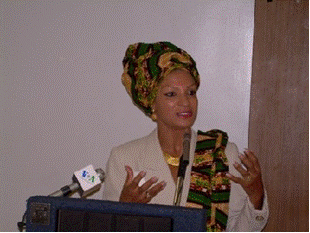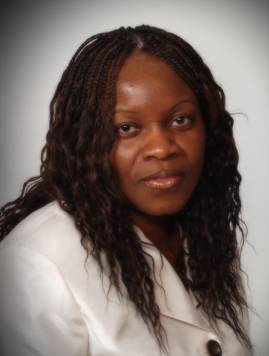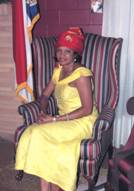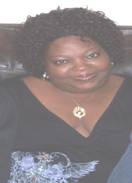Daughters Of LIHEDE Alliance
The following are brief biographies of the distinguished Daughters of LIHEDE whose lives show exceptional vision, cooperation, steadfastness, and leadership. .
| Consul Teta. Banks |
| Dr. Mariah Y. Seton |
| Mrs. Mary Moore Somah |
| Ms. Nancy Freeman |
| Dr. Patricia Jabbeh Wesley |
| Roberta Burke Williams |
| Labeth Tennema Sileaf-Varh |
| Nee Allison |
| Ms. Sylvestine Payne |
 We, the women who hereby constitute ourselves as the Daughters of LIHEDE (DOL), believe that the time has come for a new dispensation toward true equality for all women in LIHEDE, and toward a fully equal partnership of the sexes, as part of the post-conflict Liberia human rights now taking place within and beyond transboundaries of the civilized nations.
We, the women who hereby constitute ourselves as the Daughters of LIHEDE (DOL), believe that the time has come for a new dispensation toward true equality for all women in LIHEDE, and toward a fully equal partnership of the sexes, as part of the post-conflict Liberia human rights now taking place within and beyond transboundaries of the civilized nations.
The purpose of DOL is to take action to bring the daughters of LIHEDE into full participation in the mainstream of LIHEDE affairs now, exercising all the privileges and responsibilities thereof in truly equal partnership with men. LIHEDE honors and pays homage to the Daughters of Liberia for their various roles in Liberian society as mothers and teachers, leaders, and caregivers. For thousands of years starting from the Old Stone Age to the closing of the last goddess temples around AD 500, women have been in the forefront of all great civilizations. Women have from the beginning of time played various roles in society as mothers, teachers, midwives, administrators, and homemakers. And Liberian women in particular, whether western educated or traditionally educated, have continued to meaningful roles in the peace, unity, development, and growth of Liberia.
The stories of Susana Lewis and the group of women who designed the Liberian flag at the Declaration of Independence, and the stabilizing roles of Liberian women such as Madame Suakoko, Ne Yen-ni Dar, Ne Nongeteh, Ne Hweh-Gedepohoh-Titi, Ellen Mills Scarborough, Angie Brooks Randall, Abeodu Bowen Jones, Vabah Glayflor, and Ellen Johnson-Sirleaf in Liberian society are just too inspiring and exemplary to be overlooked or forgotten by any generations of Liberians. Liberian women have always had a special place in the growth and development of Liberian society from within the home, school, and community at large. Liberian women have been not only the first line of caregivers in every aspect of Liberian life, culture, and society, but also the astute managers and motivators in the offices, market centers, educational institutions, healthcare services, and social clubs. Hence, when the 14-year civil war in Liberia from 1989-2003 raged to on unabated, it was Liberian women who lit and bore the torch of peace and prevailed on the warring parties to end the senseless bloodbath and physical destructions. For example, in 1994, Liberian women became so frustrated with the pace of peace negotiations and general stability in Liberia that they organized the Liberian Women's Initiative (LWI) to directly advocate grassroots perspectives to faction leaders at regional peace negotiations. LWI targeted all parties involved in the negotiations, and by 1996 LWI began a disarmament project to assist in the collection of small arms and light weapons as part of the peace process.
By 1999, an estimated 20,000 small arms and over three million rounds of ammunition were destroyed as a result of the LWI’s efforts. Liberian, Guinean, and Sierra Leonean women grouped themselves under the Mano River Union Women Peace Network (MARWOPNET) to secure passage of UN Security Council in Resolution 1408 authorizing UN intervention to stop the civil war in Liberia, while Liberian women under the banner of Women in Peace-Building Network (WIPNET) played a pivotal role in implementation of the Disarmament, Demobilization and Reintegration (DDR) program intended to reintegrate into Liberian society ex-combatants as law-abiding citizens.
Liberian women were also instrumental in creating in post civil-war Liberia the first cabinet-level public institution devoted to gender equality, mainly women and children’s issues, the Ministry of Gender and Development. But gender equality might no longer be the preoccupation of Liberian women, as Liberia now has woman president; a woman foreign minister; a woman finance minister; a woman police director; a woman city mayor; a woman sports minister; a woman university president; a woman associate justice, women county superintendents, and women administrators in every segment of Liberian society. Hence, as a historical, educational, and development organization, LIHEDE believes that the legacy of Liberian women in terms of the roles Liberian women played in the peace, stability, and advancement of Liberian society must be carefully studied and promoted for benefit of present and future generations of Liberians. In this context, LIHEDE proposed in 2004 the establishment in Liberia of a National Center for Women Studies that will serve as a resource institution for researching and documenting the contributions and achievements of Liberian women toward the stability, sustainability, growth, and development of Liberia.
Goals of the LIHEDE National Center for Women Studies
To preserve and celebrate the leadership achievements of Liberian women, LIHEDE envisions that the National Center for Women Studies to have the following objectives:
- 1. To promote scholarship in the development and understanding of the social processes through which gender is generally constructed in society and the ways in which gender structures the lives of women and men in Liberia.
- To explore relationship between gender and social and societal categories such as class, race, ethnicity, nationality, and sexual orientation, and how these categories structure women's lives differently as compared to men.
- To promote scholarly discussion in raising public awareness of gender discrimination from the standpoint of sexism, heterosexism, ageism, and other such discriminatory tendencies that often occur at the individual, societal, and systemic levels.
- To research, study, and document contemporary and historical contributions of Liberian women to unity, peace, and development in Liberian society.
- To initiative or undertake academic programs across Liberian schools to help the students to become aware of social, political, religious, legislative, and philosophical movements locally, nationally, and internationally that enhance or diminish the social, cultural, and political status of women.
- To create micro-level programs that result in positive changes in the living standards and general lifestyles of Liberian women through the teaching of small business development skills, business management skills, and similar undertakings.
- To combat illiteracy among Liberian women and children and promote health and HIV/AIDS education among Liberian women in a broader effort at gender equality and socio-economic and cultural empowerment of Liberian women.
Rationale and Collaborative Partnership
The LIHEDE National Center for Women Studies will be the first of its kind in Liberia. It will encourage and empower Liberian students to explore the experiences and perspectives of Liberian women and to recognize the contributions of women to Liberian society. The Center will also emphasize the roles and images of gender from both a historical and contemporary perspective and examine the social construction of gender and its implications for the lives of women and men within the contexts of the family, employment, arts, entertainment, education, and religion.
LIHEDE believes that the Center for Women Studies when established will begin to address the gap in the historical record about Liberian women, and begin to discover, recover, and celebrate the great achievements of Liberian women in the development and progress of Liberia. The Center for Women Studies will not only highlight the collective heritage of Liberia from the standpoint of Liberian women, but will also restore a forgotten and neglected chapter in Liberian social policy. It should serve as a treasure trove of opportunity to international scholarship and women education in Liberia, especially if Liberian men, women, and children must study and digest the history of Liberian women and by extension Liberian society, culture, and traditions.
LIHEDE also believes that by institutionalizing our collective history, Liberians will well be on their way to creating the environment that will help Liberians learn more about themselves and cultivate a new sense of gender equality that would propel national developments in Liberia and the world.
It is in honor of our history that the Daughters of Liberia have embraced “Understanding Ourselves and Our History: A Call to Unity & Collective Development in Liberia. The Daughters of Liberia believe our nation has entered a new era, a new political horizon, where success and progress will begin with the collective showcasing of its sons and daughters talents and the finding of historical solutions to the many misinpretation of our history facing us today. Together we can create a great legacy of immeasurable treasure of knowledge for Liberian history and the next generation of Liberians by written a collective and inclusive history of our people.
 Consul Teta. Banks grew up in Detroit, Michigan where her father, the late Rev. Dr. A.A. Banks, Jr., pastored the Second Baptist Church and her mother, the late Dr. Victoria Allen Banks, was an educator and religious leader.
Consul Teta. Banks grew up in Detroit, Michigan where her father, the late Rev. Dr. A.A. Banks, Jr., pastored the Second Baptist Church and her mother, the late Dr. Victoria Allen Banks, was an educator and religious leader.
Her parents were active in the Civil Rights Movement and were personal colleagues of Dr. Martin Luther King, Sr., Dr. Martin Luther King, Jr., and Mrs. Rosa Parks. Consul Banks was educated at Wellesley College, Howard University, Wayne State University, and Oxford University. Consul Banks was first appointed in 1993, and retained in 2006 by the President of Liberia, Her Excellency Ellen Johnson-Sirleaf. Consul Banks represents the Liberian government and assists in the rebuilding of the war-torn nation, addressing human rights issues throughout Africa, and the establishment of trade, resources, and cultural relations between the U.S. and Liberia, as well as other African countries. Dr. Banks strongly believes that LIHEDE's efforts will create awareness of Liberian history and education, adding, "I'm honored for my appointment to participate in the Jubilee which will be a historic event as its goals focus on honoring our great history we have made as a people and a nation." Consul plans to do all can can to help LIHEDE in furtherance its goals and objectives.
 Dr. Mariah Y. Seton was born in Harper, Maryland County Liberia. Daughter of Nathaniel Seton and Lucy
Dr. Mariah Y. Seton was born in Harper, Maryland County Liberia. Daughter of Nathaniel Seton and Lucy
Toe Seton. She attended the college of West Africa and Konola Academy in Liberia. Dr. Seton earned two Associate Degrees from Harry Truman College, her Bsc, Master and PhD in Administration from the Roosevelt University in Chicago Dr. Seton held several administrative positions in the city of Chicago. And served as advocate for the disadvantaged, women, and the homeless. Dr. Seton adamantly believes that LIHEDE’s philosophy of giving back to your community is the best patriotic duty.
 Mrs. Mary Moore Somah is one of the original members of LIHEDE. Mary, her daughter Azenia, and sister Cynthia, became the first female members of LIHEDE after LIHEDE was co-founded in 2003 by her husband, Dr. Syrulwa Somah, along with Mr. Nat Galarea Gbessagee, and Mr. Siahyonkron Nyanseor. Mary has been the remarkable backbone behind her husband as he administers the affairs of LIHEDE in the capacity of executive director. Mary, a mother of four, including two special needs children, has consistently shouldered the responsibility of the family as her husband frequently travels to Liberia and cities across the United States on LIHEDE business. Mary is also a generous host. She has consistently invited guests attending LIHEDE-sponsored symposiums and related programs held in Greensboro to her home for a taste of Liberian cuisine and other delicacies. Mary has introduced her husband during many LIHEDE programs held in Greensboro, and she has been an active participant in all LIHEDE activities, especially the LIHEDE Cultural-Driven Malaria Campaign to help alleviate the malaria pandemic in Liberia.
Mrs. Mary Moore Somah is one of the original members of LIHEDE. Mary, her daughter Azenia, and sister Cynthia, became the first female members of LIHEDE after LIHEDE was co-founded in 2003 by her husband, Dr. Syrulwa Somah, along with Mr. Nat Galarea Gbessagee, and Mr. Siahyonkron Nyanseor. Mary has been the remarkable backbone behind her husband as he administers the affairs of LIHEDE in the capacity of executive director. Mary, a mother of four, including two special needs children, has consistently shouldered the responsibility of the family as her husband frequently travels to Liberia and cities across the United States on LIHEDE business. Mary is also a generous host. She has consistently invited guests attending LIHEDE-sponsored symposiums and related programs held in Greensboro to her home for a taste of Liberian cuisine and other delicacies. Mary has introduced her husband during many LIHEDE programs held in Greensboro, and she has been an active participant in all LIHEDE activities, especially the LIHEDE Cultural-Driven Malaria Campaign to help alleviate the malaria pandemic in Liberia.
Mrs. Mary Somah is originally from Margibi County, Liberia. She attended the Gibi Public School, the Paynesville Community School, and Monrovia College High School in Liberia before migrating to US in 1980. She graduated from Hillcrest High School in Jamaica, New York. Mary obtained her Associate of Science degree in pre-social work from Guilford Technical Community College in Jamestown, North Carolina, and Bachelor of Science in Social Work from Winston-Salem State University in Winston-Salem, North Carolina. Mary is currently working toward MSW (Masters in Social Work) degree at Winston-Salem State University. Mary cherishes her cultural roots and values, and emphasizes that family and education are priceless attributes for human development. She believes that it’s really up to the daughters of Liberia to work together in any way they can to promote Liberian history, cultural values, and traditions as a stepping stone to national unity and individual empowerment. Mary is glad to affiliate with the Daughters of LIHEDE, and it is her belief that only Liberians can set the right direction for lasting peace, national unity, professional cooperation, and development in Liberia.
 Nancy Freeman is an immigrant from Liberia, who relocated to the United States of America in 2002. Before relocating to the United States of America, Ms. Freeman worked for twenty-four years in various administrative positions. She worked at the Booker T. Washington as clerk typist, Liberian Rubber Development Unit (LRDU) as executive secretary, the Monrovia Transit Authority as an executive secretary, Bong Mining Company as secretary, the Children Assistance Program as office manager, Carlton Resources Inc. (CRI) as office manager and the Central Bank of Liberia as executive secretary to the executive governor. After twenty-one years, she went back to school and attained her Bachelor of Business Administration from the African Methodist Episcopal University. She also holds a Master of Business Administration with emphasis on Human Resources Management from the University of Phoenix and she is presently a doctoral student from the University of Phoenix, working on her dissertation. Her dissertation topic is: The Educational Path for Liberian Women and she hopes that research studies will unfold the challenges and opportunities that the women of Liberia encountered to have crossed cultural and traditional borders of male dominated society and attained higher education, which has made Liberian women stewards of state power in the 21st. century.
Nancy Freeman is an immigrant from Liberia, who relocated to the United States of America in 2002. Before relocating to the United States of America, Ms. Freeman worked for twenty-four years in various administrative positions. She worked at the Booker T. Washington as clerk typist, Liberian Rubber Development Unit (LRDU) as executive secretary, the Monrovia Transit Authority as an executive secretary, Bong Mining Company as secretary, the Children Assistance Program as office manager, Carlton Resources Inc. (CRI) as office manager and the Central Bank of Liberia as executive secretary to the executive governor. After twenty-one years, she went back to school and attained her Bachelor of Business Administration from the African Methodist Episcopal University. She also holds a Master of Business Administration with emphasis on Human Resources Management from the University of Phoenix and she is presently a doctoral student from the University of Phoenix, working on her dissertation. Her dissertation topic is: The Educational Path for Liberian Women and she hopes that research studies will unfold the challenges and opportunities that the women of Liberia encountered to have crossed cultural and traditional borders of male dominated society and attained higher education, which has made Liberian women stewards of state power in the 21st. century.
While in graduate school, Nancy did a six months internship with the Corporate Council on Africa, an organization based in Washington, D.C., she worked as an office manager with the Fellowship Foundation, a non-governmental organization with offices in Northern Virginia. While pursuing her doctoral studies, Nancy worked as an administrative assistant for the Fairfax County Government, assigned to the department of family services.
Dr. Patricia Jabbeh Wesley immigrated with her family to the United States during the Liberian civil war. She is the author of three full length books of poetry: The River is Rising, (Autumn House Press, Pittsburgh, PA 2007) Becoming Ebony (Southern Illinois University Press, 2003) and Before the Palm Could Bloom: Poems of Africa (New issues Press Poetry, Michigan, 1998). She has published numerous poems non-fiction memoir articles in several American and international literary magazines and anthologies. Dr. Wesley is working on her fourth book of poetry, a children’s book, and a civil war memoir. She has given hundreds of poetry readings and talks over the years and most recently throughout the United States, in Spanish America, Asia and Africa. Patricia is the recipient of several literary awards and nominations, including, the 2002 Crab Orchard Award for Becoming Ebony, the Anisfield-Wolf Award Nomination for The River is Rising, Individual Artist Awards from the Kalamazoo Foundation, among others. She has a Ph.D. in Creative Writing and English, a Masters Degree in English Education, and a BA in English. From 1980-1990, Dr. Wesley taught English and Literature courses at the University of Liberia in Monrovia. In the United States, Dr. Wesley has taught on the English faculty at Western Michigan University and at Indiana University of Pennsylvania, IUP. Dr. Wesley is currently Assistant Professor of English and Creative Writing at Pennsylvania State University’s Altoona campus, and lives in Pennsylvania with her family.
 Roberta Burke Williams was born to the union of Robert A. Burke and Agnes Bailey Howell on June 10, 1962 in Monrovia , Liberia . She spent most of her formative childhood in Sinoe County and vacationed in Monrovia with her father’s family. In 1977, at the tender age of 15, young Roberta left Liberia to come to the United States in 1977 to go to school. While in Washington, DC she attended Dunbar Senior high school and went on to higher education at University of the District of Columbia, completing her Bachelor of Arts in Business Administration at Morgan State University, Baltimore, MD.
Roberta Burke Williams was born to the union of Robert A. Burke and Agnes Bailey Howell on June 10, 1962 in Monrovia , Liberia . She spent most of her formative childhood in Sinoe County and vacationed in Monrovia with her father’s family. In 1977, at the tender age of 15, young Roberta left Liberia to come to the United States in 1977 to go to school. While in Washington, DC she attended Dunbar Senior high school and went on to higher education at University of the District of Columbia, completing her Bachelor of Arts in Business Administration at Morgan State University, Baltimore, MD.
Roberta married at an early age of 18 to her high school sweetheart and this union was blessed with two sons David age 26 and Kolleh 19. In 2001, the Williams adopted the newest members of their family, her aunt’s 5 years old daughter Breanna from Liberia . She is presently working on her master at Harrisburg University majoring in Computer Data Warehousing/Management. Roberta works for a large hospital in York , PA as one of the IT Software Specialists.
Roberta presently lives in York , PA with her daughter and grand daughter Aslynn aka, Ladybug. She is involved in her church, local and international organizations which allows her to utilize her various talents, education and work experiences.
 Labeth Tennema Sileaf-Varh was born to Muslim parents Musa Dukuly Sirleaf and Wonnie Coff-Sirleaf in Kakata, Liberia. She is lovingly called Lady T or LV by her family and friends. She grew up in the loving arms of multiple mothers who nurtured her with care and compassion. What can be said is that a child born and raised in the Musa Dukuly Sirleaf family was bound to learn how to speak Mandingo, Kpelle and Vai who made up the tapestry of his family. Her family mosaic taught her the true meanings of what an extended family, Liberian oneness and bridged the gaps of cultural or linguistic difference. Though her father, Musa Dukuly Sirleaf whom she adored and idolized, was a dedicated Muslim, he never imposed his faith upon her, but gave her and her siblings the freedom to choose their religious persuasion.
Labeth Tennema Sileaf-Varh was born to Muslim parents Musa Dukuly Sirleaf and Wonnie Coff-Sirleaf in Kakata, Liberia. She is lovingly called Lady T or LV by her family and friends. She grew up in the loving arms of multiple mothers who nurtured her with care and compassion. What can be said is that a child born and raised in the Musa Dukuly Sirleaf family was bound to learn how to speak Mandingo, Kpelle and Vai who made up the tapestry of his family. Her family mosaic taught her the true meanings of what an extended family, Liberian oneness and bridged the gaps of cultural or linguistic difference. Though her father, Musa Dukuly Sirleaf whom she adored and idolized, was a dedicated Muslim, he never imposed his faith upon her, but gave her and her siblings the freedom to choose their religious persuasion.
As a young girl, LV attended primary school at St. Augustine Episcopal School but was sent on Apostolic Alliance (Gibi) Mission in Worhn, Margibi, where she acquired her elementary education. She later attended St. Christopher High School in Kakata, Monrovia College (MC) and Assembly of God High School (AGM) in Monrovia, where she graduated from high school.
LV came to the US in pursuit of better opportunities and she earned her undergraduate degree in Communication Arts from Catawba College and a Masters’ Degree in Rehabilitation Counseling from Winston Salem State University. She is a communication arts and counselor by profession.
LV is happily married to Nyanmah Eric Varh, a wonderful and affectionate man with whom she has three beautiful girls: Aiah, Nyla, and Natasha. She is a living example of how family, faith and community combined to achieve a way of life that reflects every positive trait that gives meaning to everything that counts along the way. For the most part, LV is a woman of strong faith and strength who shows courage in the midst of adversity and generosity that is not so much common in our human community.
LV believes that when she gives, she gives the best of her with the understanding that sometimes people see that as a sign of weakness, but to her life’s mistakes can be blessings from God. She often says, “I know that God does not let his children fall; he catches them before they do, and when they do, he reaches down and pulls them up.” She believes that God endows her with his grace and so any life’s journey she takes, fearlessly does so. Labeth loves people, especially children. To her, children are wonderful to learn from in our lives by listening to their counsel, watch what they do, the way they treat others. “There is something about them; their innocence, sincerity, curiosity and more”, she often says.
She embraces her Liberian heritage with pride and dignity. LV also believes that nonprofit organizations such as LIHEDE need greater support from all Liberians. She is pleased that LIHEDE is taking the steps to address Liberian needs. As the DOL first Chairlady, she has a clear mission and vision to rally her members to achieve their shared vision.
 Nee Allison was born and raised in Monrovia, Liberia unto the union of Mr. Henry Y. Allison and Mrs. Martha Wallace-Allison. Her parents were devoted Christians who hailed from Maryland County in the southeastern region of Liberia. Miss Allison was raised by her parents under strict Christian principles.
Nee Allison was born and raised in Monrovia, Liberia unto the union of Mr. Henry Y. Allison and Mrs. Martha Wallace-Allison. Her parents were devoted Christians who hailed from Maryland County in the southeastern region of Liberia. Miss Allison was raised by her parents under strict Christian principles.
Nee started her primary and secondary education in the political capital of Liberia and successful obtained her high school certificate from B. W. Harris Episcopal High School. Upon the completion of secondary school, she enrolled at the nation’s highest institution of learning, the University of Liberia. She obtained a Bachelor of Arts degree with major in Management and minor in Accounting from the College of Business and Public Administration of the University of Liberia in 1996. Nee is scheduled to receive a Masters of Social Work degree with emphasis in Mental Health from Howard University in May 2009.
Ms. Allison has held several positions in the public, private and non-for –profit sectors. In Liberia, she worked as cadet at the Ministry of Information and as an analyst at the Liberia Petroleum Refining Corporation, LPRC. She also volunteered for the Special Emergency Food Program, SELF, sponsored by the World Food Program, WFP during the civil crisis in Liberia. As a refugee in La Cote D’Ivoire, Nee volunteered with the local Red Cross Society. In the United States Nee worked for the American Red Cross Society. As evidence of her versatility, intellectually competence and rectitude, Nee held several positions with the American Red Cross Society including Senior Administrative Assistant, to the Senior Vice President for International Services and the Vice President for Strategic Development, Consultant to the Family Tracing Unit, Acting Regional Program Assistant and Event Planner. Currently she works as a Case Manager at Progressive Life Center, a mental health organization that provides therapeutic services for children with emotional and behavioral problems.
Nee Allison has received professional and specialized training in various disciplines, spanning business and human services. Based on her vast experience and extensive training, she has brought innovation and creativity to most of the organizations and institutions she served. In this regards, she assumed a pivotal role in development of training programs and procedures for caseworkers working in armed conflict and asylum seeking. She specifically introduced elements that focused on cultural sensitivity and competency involving clients from Africa with focus on (Liberia). Her work as an Event Planner facilitated her involvement in the planning of numerous events including the Annual Measles Initiatives gathering, the Red Cross 125 Anniversary, International Communicators Quarterly Board meetings among others. An avid believer, she also volunteered as a Sunday School Teacher at the Groveton Baptist Church in Alexandria, Virginia. Nee attended the 2007 international meeting Planners Conference in Montreal, and is a member of the National Association of Social Workers. Amid her busy schedule, she has devoted time in raising her 11year old daughter.
 Ms. Sylvestine Payne, MSW, is Jubilee Operations Manager and Program Chairperson of the Daughters of LIHEDE. She is a professional social worker, and owner and administrator of assisted living residential facilities located in Fayetteville and Jonesboro, two suburbs of Atlanta, Georgia. Ms. Payne, a graduate of Monrovia Central High School in Liberia, came to the U.S. in 1987 after spending two-years in the mass communication program at the University of Liberia. Ms. Payne eventually settled in Savanna, Georgia where she obtained her bachelor’s and master’s degrees in Social Work from Savannah State University. She worked as a clinical social worker with the State of Georgia in Savannah for eight years before establishing her own business in 1998. She operated her business in Savannah for close to ten years before relocating to Fayetteville in 2007. Ms. Payne is a Christian and an active member of Speedwell United Methodist Church in Fayetteville. She serves as chairperson of the Church’s social action committee and a member of the United Methodist Women. She is also an active member of the Liberian Community Association of Metropolitan Atlanta (LAMA), and serves as co-chairman of the association’s board of directors. Ms. Payne is national president of her high school alumni association, and co-founder of Concern Women of Georgia, an all-female group providing recreational and social services to children living in Liberia and the Diaspora Liberian community in the U.S. Born in Yekepa, Nimba County, Liberia to parents hailing from Grand Bassa County, Liberia. Ms. Payne lived in Monrovia most of her life. She attended Cathedral High School from kindergarten to eighth grade and Monrovia Central High School from 9th grade through 12th grade.
Ms. Sylvestine Payne, MSW, is Jubilee Operations Manager and Program Chairperson of the Daughters of LIHEDE. She is a professional social worker, and owner and administrator of assisted living residential facilities located in Fayetteville and Jonesboro, two suburbs of Atlanta, Georgia. Ms. Payne, a graduate of Monrovia Central High School in Liberia, came to the U.S. in 1987 after spending two-years in the mass communication program at the University of Liberia. Ms. Payne eventually settled in Savanna, Georgia where she obtained her bachelor’s and master’s degrees in Social Work from Savannah State University. She worked as a clinical social worker with the State of Georgia in Savannah for eight years before establishing her own business in 1998. She operated her business in Savannah for close to ten years before relocating to Fayetteville in 2007. Ms. Payne is a Christian and an active member of Speedwell United Methodist Church in Fayetteville. She serves as chairperson of the Church’s social action committee and a member of the United Methodist Women. She is also an active member of the Liberian Community Association of Metropolitan Atlanta (LAMA), and serves as co-chairman of the association’s board of directors. Ms. Payne is national president of her high school alumni association, and co-founder of Concern Women of Georgia, an all-female group providing recreational and social services to children living in Liberia and the Diaspora Liberian community in the U.S. Born in Yekepa, Nimba County, Liberia to parents hailing from Grand Bassa County, Liberia. Ms. Payne lived in Monrovia most of her life. She attended Cathedral High School from kindergarten to eighth grade and Monrovia Central High School from 9th grade through 12th grade.

